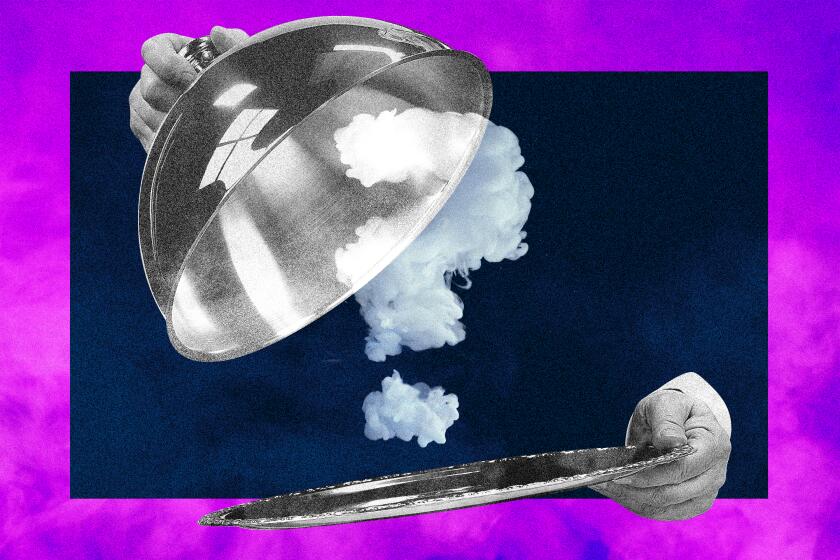Patient loses appeal on medical marijuana
Medical marijuana patient Angel Raich’s latest bid to win protection from federal drug laws went down to defeat Wednesday in U.S. appeals court despite her claim that cannabis is the only medicine that keeps her alive.
The ruling by the U.S. 9th Circuit Court of Appeals is the second big legal loss in two years for Raich, 41, an Oakland mother of two who suffers from more than a dozen chronic illnesses, including an inoperable brain tumor.
“I feel like I’m a dead man walking because I’m the first person in the country who has been told they do not have a right to life,” a sobbing Raich said after learning of the ruling. “I’m trying really hard to remember the word ‘courage’ -- because courage is nothing more than well-concealed fear.”
In 2005 the U.S. Supreme Court rebuffed Raich, who has never been charged with a crime but sought to make her plight a test case to win protection for the nation’s more than 100,000 medical-marijuana patients.
The high court reaffirmed the right of the U.S. government to wage criminal prosecutions against patients and suppliers, even in California and 10 other states where cannabis is a legal medicine.
Raich renewed her case before a three-judge panel of the 9th Circuit, focusing her arguments on the “medical necessity” of her marijuana use. Her physician says pot, which Raich inhales every two hours, is the only drug that assuages her afflictions, which include a seizure disorder and chronic pain.
In a 32-page opinion, Judge Harry Pregerson said Raich failed to prove her case for an injunction that would bar U.S. drug agents from lodging a criminal case against her.
But the judge expressed sympathy for Raich’s medical plight and need for marijuana, asserting that she probably would meet the requirements to claim a medical necessity if she were ever criminally prosecuted by the U.S. for her pot use.
Pregerson wrote that Raich was faced with a choice between “the lesser of two evils.” The judge said she probably met the legal criteria for a medical necessity defense: establishing that her illnesses put her in imminent harm, showing that pot managed her pain and demonstrating that she had been unable to find legal medical alternatives to cannabis, Pregerson wrote.
But Pregerson noted the difficulty of using medical necessity to argue for a blanket shield against a future federal prosecution. The possibility existed, he wrote, that Raich could make a miraculous recovery or find a legal alternative to pot, undermining any justification for such a shield. While noting a “clear trend” toward state laws allowing medical marijuana, Pregerson said that those rights have failed to gain “the traction” on a national scale to be seen as a right deserving protection.
In a short companion opinion, Judge C. Arlen Beam concurred with the overall ruling but took exception to Pregerson’s consideration of Raich’s medical necessity arguments.
Beam said that without a criminal case filed against Raich, the court was premature in addressing the necessity issue. Moreover, he said both sides in the case conceded that there was no federal prosecution pending or threatened against Raich or anyone else for possession or use of medical marijuana.
Raich’s medicinal need for cannabis has not been put to the test as it would be under the scrutiny of a criminal prosecution, Beam wrote. He also suggested that Raich has legal alternatives available, such as Marinol. Marinol is an FDA-approved synthetic drug containing THC, the most psychoactive of marijuana’s scores of chemical constituents.
Raich and her attorneys said they planned to press forward with a possible appeal to a larger 9th Circuit panel or new arguments to a lower federal court.
Raich said she sees a need to change federal law prohibiting medical cannabis.
California approved its medical marijuana initiative in 1996, and 10 other states adopted similar laws, but cannabis remains prohibited by the federal government for all uses except approved research studies.
“All I can say is that I am not going to stop using cannabis -- and I need help from the American people,” she said. “We need to tell Congress this is wrong, and we need a law protecting medical cannabis patients.”
Bruce Mirken, a spokesman for the Marijuana Policy Project, an advocacy group, said that although the ruling is a setback for Raich, it is “at worst a very small bump in the road for medical marijuana.”
He said research continues to accumulate in favor of marijuana’s benefits and support is growing in Congress. Meanwhile, lawmakers in New Mexico -- with the backing of Democratic Gov. Bill Richardson, a presidential hopeful -- appear poised to make that state the nation’s 12th to legalize medical cannabis.
Mirken also said that the latest Raich ruling does nothing to undercut the law in California -- and said mass federal arrests of patients remain unlikely.
More to Read
Start your day right
Sign up for Essential California for news, features and recommendations from the L.A. Times and beyond in your inbox six days a week.
You may occasionally receive promotional content from the Los Angeles Times.






